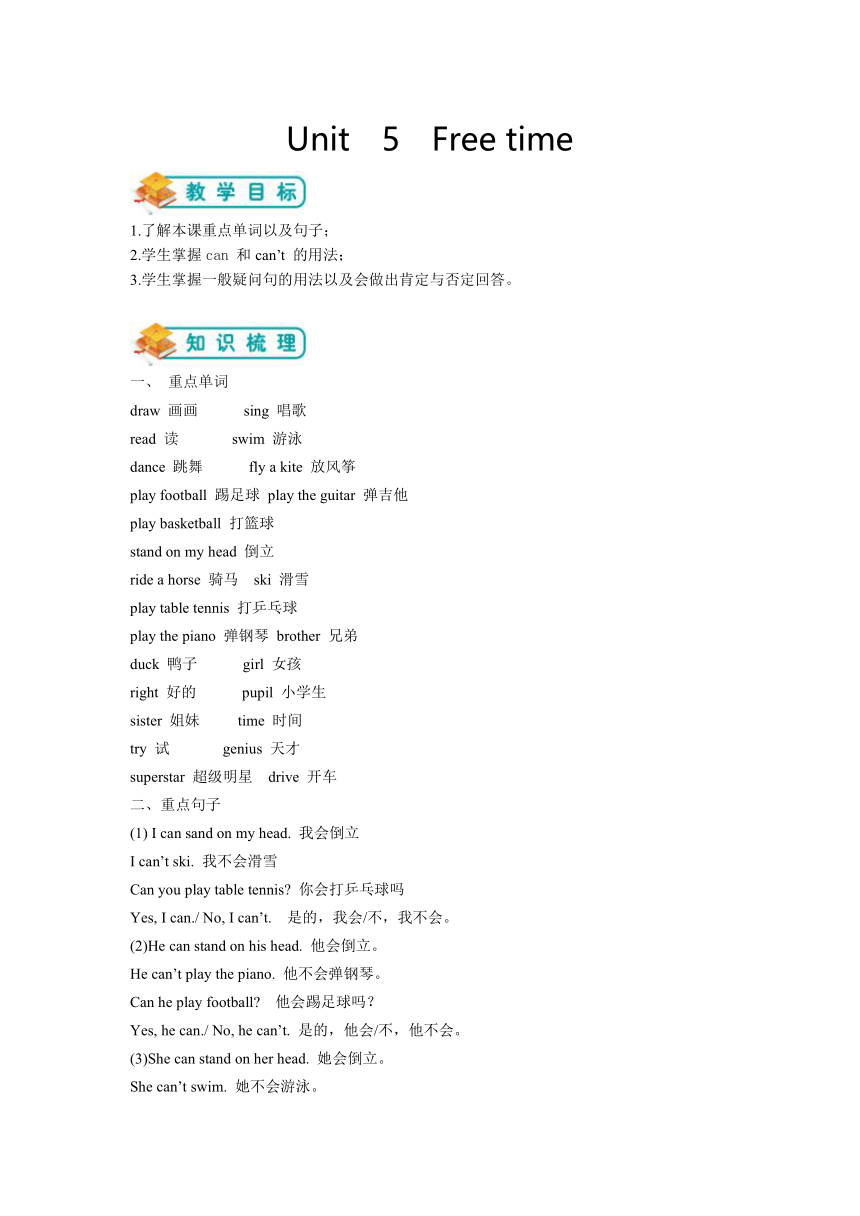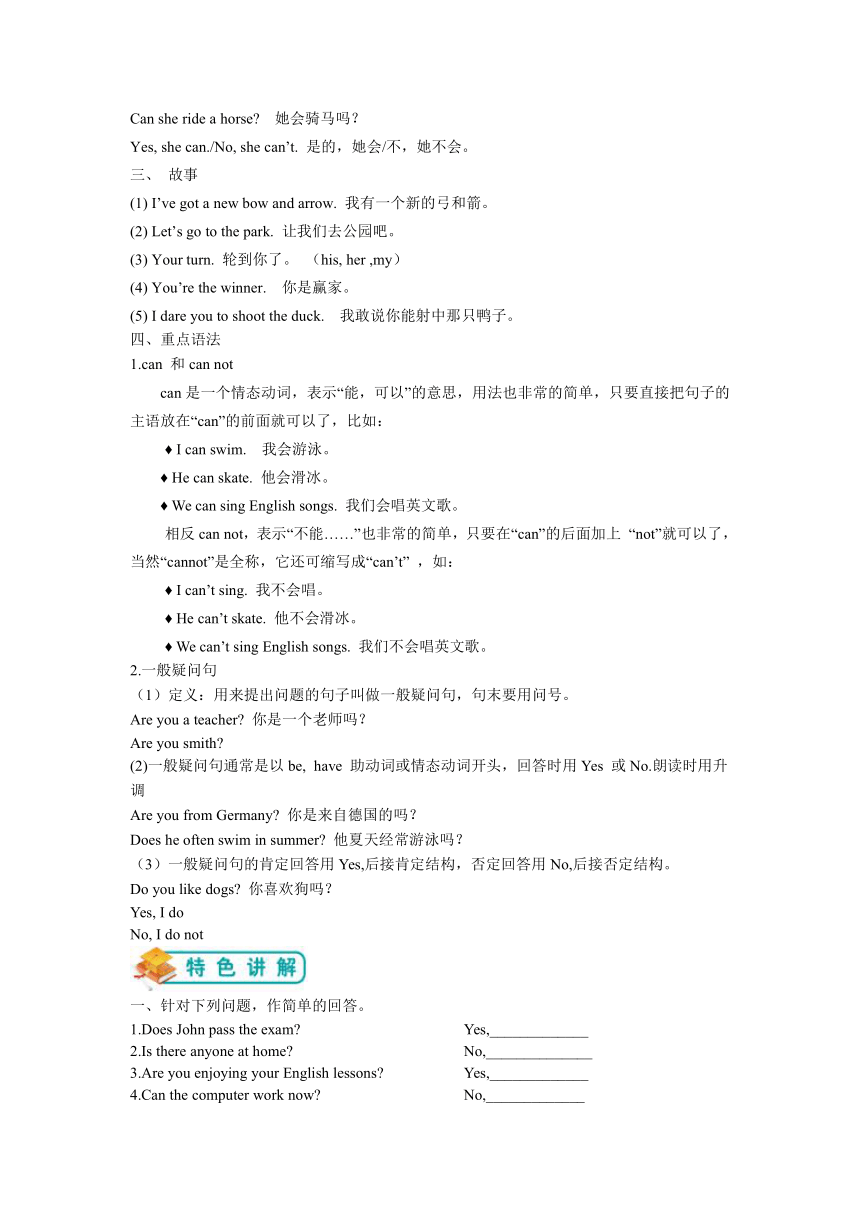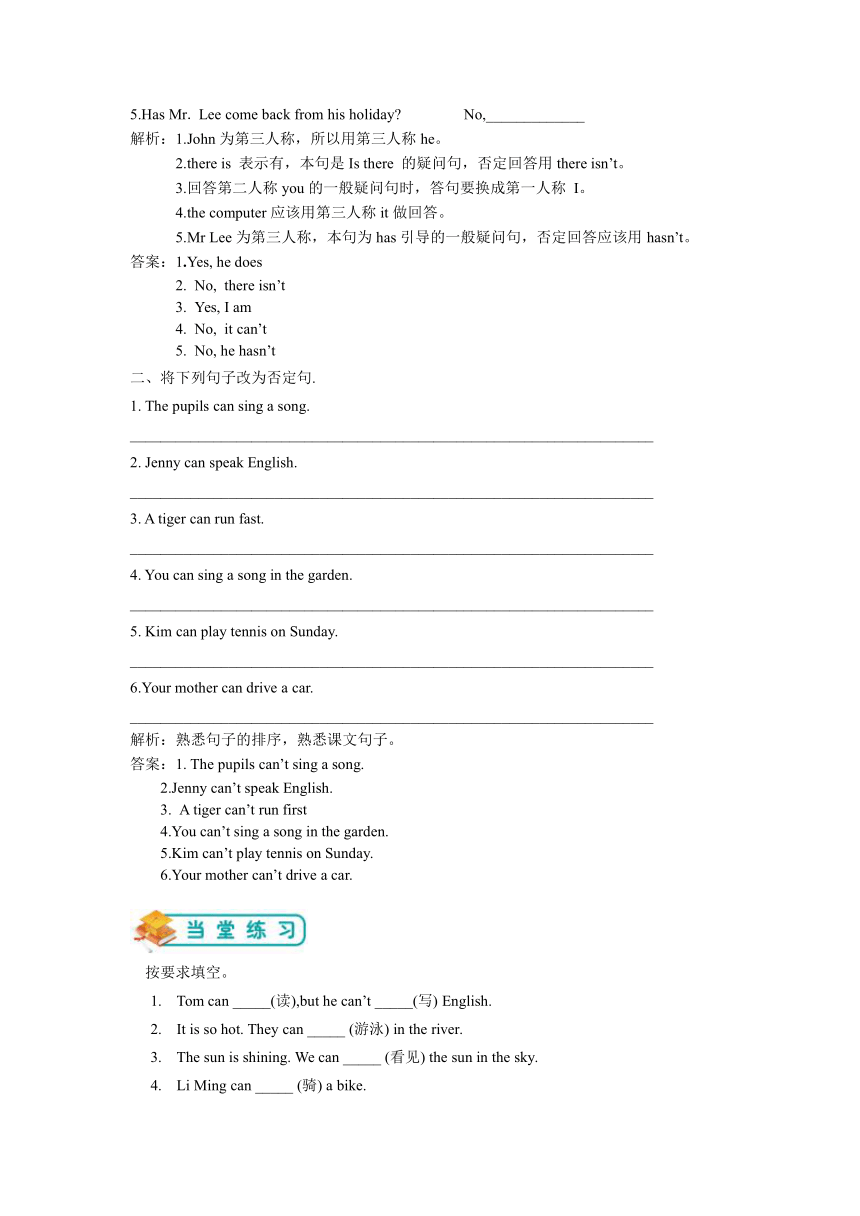四年级英语上册试题-Unit 5 Free time(含答案) join in 剑桥英语
文档属性
| 名称 | 四年级英语上册试题-Unit 5 Free time(含答案) join in 剑桥英语 |

|
|
| 格式 | doc | ||
| 文件大小 | 349.8KB | ||
| 资源类型 | 教案 | ||
| 版本资源 | 外研版(刘兆义主编) | ||
| 科目 | 英语 | ||
| 更新时间 | 2022-08-15 10:36:41 | ||
图片预览



文档简介
Unit 5 Free time
了解本课重点单词以及句子;
学生掌握can 和can’t 的用法;
学生掌握一般疑问句的用法以及会做出肯定与否定回答。
一、 重点单词
draw 画画 sing 唱歌
read 读 swim 游泳
dance 跳舞 fly a kite 放风筝
play football 踢足球 play the guitar 弹吉他
play basketball 打篮球
stand on my head 倒立
ride a horse 骑马 ski 滑雪
play table tennis 打乒乓球
play the piano 弹钢琴 brother 兄弟
duck 鸭子 girl 女孩
right 好的 pupil 小学生
sister 姐妹 time 时间
try 试 genius 天才
superstar 超级明星 drive 开车
二、重点句子
(1) I can sand on my head. 我会倒立
I can’t ski. 我不会滑雪
Can you play table tennis 你会打乒乓球吗
Yes, I can./ No, I can’t. 是的,我会/不,我不会。
(2)He can stand on his head. 他会倒立。
He can’t play the piano. 他不会弹钢琴。
Can he play football 他会踢足球吗?
Yes, he can./ No, he can’t. 是的,他会/不,他不会。
(3)She can stand on her head. 她会倒立。
She can’t swim. 她不会游泳。
Can she ride a horse 她会骑马吗?
Yes, she can./No, she can’t. 是的,她会/不,她不会。
三、 故事
(1) I’ve got a new bow and arrow. 我有一个新的弓和箭。
(2) Let’s go to the park. 让我们去公园吧。
(3) Your turn. 轮到你了。 (his, her ,my)
(4) You’re the winner. 你是赢家。
(5) I dare you to shoot the duck. 我敢说你能射中那只鸭子。
四、重点语法
1.can 和can not
can是一个情态动词,表示“能,可以”的意思,用法也非常的简单,只要直接把句子的主语放在“can”的前面就可以了,比如:
I can swim. 我会游泳。
He can skate. 他会滑冰。
We can sing English songs. 我们会唱英文歌。
相反can not,表示“不能……”也非常的简单,只要在“can”的后面加上 “not”就可以了,当然“cannot”是全称,它还可缩写成“can’t” ,如:
I can’t sing. 我不会唱。
He can’t skate. 他不会滑冰。
We can’t sing English songs. 我们不会唱英文歌。
一般疑问句
定义:用来提出问题的句子叫做一般疑问句,句末要用问号。
Are you a teacher 你是一个老师吗?
Are you smith
(2)一般疑问句通常是以be, have 助动词或情态动词开头,回答时用Yes 或No.朗读时用升调
Are you from Germany 你是来自德国的吗?
Does he often swim in summer 他夏天经常游泳吗?
一般疑问句的肯定回答用Yes,后接肯定结构,否定回答用No,后接否定结构。
Do you like dogs 你喜欢狗吗?
Yes, I do
No, I do not
一、针对下列问题,作简单的回答。
Does John pass the exam Yes,_____________
Is there anyone at home No,______________
Are you enjoying your English lessons Yes,_____________
Can the computer work now No,_____________
Has Mr. Lee come back from his holiday No,_____________
解析:1.John为第三人称,所以用第三人称he。
2.there is 表示有,本句是Is there 的疑问句,否定回答用there isn’t。
3.回答第二人称you的一般疑问句时,答句要换成第一人称 I。
4.the computer应该用第三人称it做回答。
5.Mr Lee为第三人称,本句为has引导的一般疑问句,否定回答应该用hasn’t。
答案:1.Yes, he does
2. No, there isn’t
3. Yes, I am
4. No, it can’t
5. No, he hasn’t
二、将下列句子改为否定句.
1. The pupils can sing a song.
_____________________________________________________________________
2. Jenny can speak English.
_____________________________________________________________________
3. A tiger can run fast.
_____________________________________________________________________
4. You can sing a song in the garden.
_____________________________________________________________________
5. Kim can play tennis on Sunday.
_____________________________________________________________________
6.Your mother can drive a car.
_____________________________________________________________________
解析:熟悉句子的排序,熟悉课文句子。
答案:1. The pupils can’t sing a song.
Jenny can’t speak English.
3. A tiger can’t run first
You can’t sing a song in the garden.
Kim can’t play tennis on Sunday.
Your mother can’t drive a car.
按要求填空。
Tom can _____(读),but he can’t _____(写) English.
It is so hot. They can _____ (游泳) in the river.
The sun is shining. We can _____ (看见) the sun in the sky.
Li Ming can _____ (骑) a bike.
He can ______ (听) to the radio now.
I can _____ (唱), but I can’t _____ (画画).
I don’t like running .I can’t _____ (跑) fast.
We are the students. We can _____ (说) Chinese.
School is over .Let’s _____ (去) shopping.
Peter is young .He can ____ (坐) in front of me.
一、陈述句变一般疑问句
1. His father is an English teacher.
____________________________________________________________________________________
2. These cats are crying.
_____________________________________________________________________________________
3. They can swim.
_____________________________________________________________________________________
4. I like to read English.
______________________________________________________________________________________
5. I go to school on foot.
______________________________________________________________________________________
二、将下列句子改成一般疑问句:
1. It is a lovely dog. ________________________________________
2. She is lovely girl.________________________________________
3. He is my father._________________________________________
4. They are Lily’s cousins. ___________________________________
5. We are classmates. ______________________________________
_________________________________________________________________________________
_______________________________________________________________________________
一、用do does be 填空
1. _____ she know all the answers
Yes, she ____. No, she _____.
2._____ the twins often fight
Yes, _____ do. No, _____ don’t.
3._____ your dad like listening to music
Yes ,____ does . No, _____ doesn’t.
4._____ uncle Tom wash his car every day
Yes , ____ does . No, ____ doesn’t.
5. _____ you have a new teacher
Yes, I ______. No, I ______.
6. _____ she a teacher
Yes, she _____ . No, she _____.
7.______ you playing ball now
Yes, I ______. No, I ______.
8. ______ the pig like to sleep
Yes, it ______. No, it _____.
9. ______ five birds flying in the sky
Yes, they _____ .No, ____ aren’t.
10._____ your father smoking in the living room
Yes, ____ is .No, he _____.
参考答案
一、1.Yes, he does
2. No, there isn’t
3. Yes, I am
4. No, it can’t
5. No, he hasn’t
解析:1.John为第三人称,所以用第三人称he
2.there is 表示有,本句是Is there 的疑问句,否定回答用there isn’t
3.回答第二人称you的一般疑问句时,答句要换成第一人称 I
4.the computer应该用第三人称it做回答
5.Mr Lee为第三人称,本句为has引导的一般疑问句,否定回答应该用hasn’t
二、1. The pupils can’t sing a song.
Jenny can’t speak English.
3.A tiger can’t run first
You can’t sing a song in the garden.
Kim can’t play tennis on Sunday.
Your mother can’t drive a car.
read 2.swim 3. see 4.ride 5.listen
6.sing; draw 7. run 8.speak 9.go 10.sit
一、1. Is his father an English teacher
2. Are these cats crying
3. Can they swim
4. Do you like to read English
5. Do you go to school on foot
二、1. Is it a lovely dog
2. Is she a lovely girl
3. Is he my father
4. Are they Lily’s cousins
5. Are you classmates
Does; Does; doesn’t
Do; they; they
Does; he; he
Does; he; he
Do; do; don’t
Is; is; isn’t
Are; am; am not
Does; does; doesn’t
Are; are; they
Is; he; isn’t
了解本课重点单词以及句子;
学生掌握can 和can’t 的用法;
学生掌握一般疑问句的用法以及会做出肯定与否定回答。
一、 重点单词
draw 画画 sing 唱歌
read 读 swim 游泳
dance 跳舞 fly a kite 放风筝
play football 踢足球 play the guitar 弹吉他
play basketball 打篮球
stand on my head 倒立
ride a horse 骑马 ski 滑雪
play table tennis 打乒乓球
play the piano 弹钢琴 brother 兄弟
duck 鸭子 girl 女孩
right 好的 pupil 小学生
sister 姐妹 time 时间
try 试 genius 天才
superstar 超级明星 drive 开车
二、重点句子
(1) I can sand on my head. 我会倒立
I can’t ski. 我不会滑雪
Can you play table tennis 你会打乒乓球吗
Yes, I can./ No, I can’t. 是的,我会/不,我不会。
(2)He can stand on his head. 他会倒立。
He can’t play the piano. 他不会弹钢琴。
Can he play football 他会踢足球吗?
Yes, he can./ No, he can’t. 是的,他会/不,他不会。
(3)She can stand on her head. 她会倒立。
She can’t swim. 她不会游泳。
Can she ride a horse 她会骑马吗?
Yes, she can./No, she can’t. 是的,她会/不,她不会。
三、 故事
(1) I’ve got a new bow and arrow. 我有一个新的弓和箭。
(2) Let’s go to the park. 让我们去公园吧。
(3) Your turn. 轮到你了。 (his, her ,my)
(4) You’re the winner. 你是赢家。
(5) I dare you to shoot the duck. 我敢说你能射中那只鸭子。
四、重点语法
1.can 和can not
can是一个情态动词,表示“能,可以”的意思,用法也非常的简单,只要直接把句子的主语放在“can”的前面就可以了,比如:
I can swim. 我会游泳。
He can skate. 他会滑冰。
We can sing English songs. 我们会唱英文歌。
相反can not,表示“不能……”也非常的简单,只要在“can”的后面加上 “not”就可以了,当然“cannot”是全称,它还可缩写成“can’t” ,如:
I can’t sing. 我不会唱。
He can’t skate. 他不会滑冰。
We can’t sing English songs. 我们不会唱英文歌。
一般疑问句
定义:用来提出问题的句子叫做一般疑问句,句末要用问号。
Are you a teacher 你是一个老师吗?
Are you smith
(2)一般疑问句通常是以be, have 助动词或情态动词开头,回答时用Yes 或No.朗读时用升调
Are you from Germany 你是来自德国的吗?
Does he often swim in summer 他夏天经常游泳吗?
一般疑问句的肯定回答用Yes,后接肯定结构,否定回答用No,后接否定结构。
Do you like dogs 你喜欢狗吗?
Yes, I do
No, I do not
一、针对下列问题,作简单的回答。
Does John pass the exam Yes,_____________
Is there anyone at home No,______________
Are you enjoying your English lessons Yes,_____________
Can the computer work now No,_____________
Has Mr. Lee come back from his holiday No,_____________
解析:1.John为第三人称,所以用第三人称he。
2.there is 表示有,本句是Is there 的疑问句,否定回答用there isn’t。
3.回答第二人称you的一般疑问句时,答句要换成第一人称 I。
4.the computer应该用第三人称it做回答。
5.Mr Lee为第三人称,本句为has引导的一般疑问句,否定回答应该用hasn’t。
答案:1.Yes, he does
2. No, there isn’t
3. Yes, I am
4. No, it can’t
5. No, he hasn’t
二、将下列句子改为否定句.
1. The pupils can sing a song.
_____________________________________________________________________
2. Jenny can speak English.
_____________________________________________________________________
3. A tiger can run fast.
_____________________________________________________________________
4. You can sing a song in the garden.
_____________________________________________________________________
5. Kim can play tennis on Sunday.
_____________________________________________________________________
6.Your mother can drive a car.
_____________________________________________________________________
解析:熟悉句子的排序,熟悉课文句子。
答案:1. The pupils can’t sing a song.
Jenny can’t speak English.
3. A tiger can’t run first
You can’t sing a song in the garden.
Kim can’t play tennis on Sunday.
Your mother can’t drive a car.
按要求填空。
Tom can _____(读),but he can’t _____(写) English.
It is so hot. They can _____ (游泳) in the river.
The sun is shining. We can _____ (看见) the sun in the sky.
Li Ming can _____ (骑) a bike.
He can ______ (听) to the radio now.
I can _____ (唱), but I can’t _____ (画画).
I don’t like running .I can’t _____ (跑) fast.
We are the students. We can _____ (说) Chinese.
School is over .Let’s _____ (去) shopping.
Peter is young .He can ____ (坐) in front of me.
一、陈述句变一般疑问句
1. His father is an English teacher.
____________________________________________________________________________________
2. These cats are crying.
_____________________________________________________________________________________
3. They can swim.
_____________________________________________________________________________________
4. I like to read English.
______________________________________________________________________________________
5. I go to school on foot.
______________________________________________________________________________________
二、将下列句子改成一般疑问句:
1. It is a lovely dog. ________________________________________
2. She is lovely girl.________________________________________
3. He is my father._________________________________________
4. They are Lily’s cousins. ___________________________________
5. We are classmates. ______________________________________
_________________________________________________________________________________
_______________________________________________________________________________
一、用do does be 填空
1. _____ she know all the answers
Yes, she ____. No, she _____.
2._____ the twins often fight
Yes, _____ do. No, _____ don’t.
3._____ your dad like listening to music
Yes ,____ does . No, _____ doesn’t.
4._____ uncle Tom wash his car every day
Yes , ____ does . No, ____ doesn’t.
5. _____ you have a new teacher
Yes, I ______. No, I ______.
6. _____ she a teacher
Yes, she _____ . No, she _____.
7.______ you playing ball now
Yes, I ______. No, I ______.
8. ______ the pig like to sleep
Yes, it ______. No, it _____.
9. ______ five birds flying in the sky
Yes, they _____ .No, ____ aren’t.
10._____ your father smoking in the living room
Yes, ____ is .No, he _____.
参考答案
一、1.Yes, he does
2. No, there isn’t
3. Yes, I am
4. No, it can’t
5. No, he hasn’t
解析:1.John为第三人称,所以用第三人称he
2.there is 表示有,本句是Is there 的疑问句,否定回答用there isn’t
3.回答第二人称you的一般疑问句时,答句要换成第一人称 I
4.the computer应该用第三人称it做回答
5.Mr Lee为第三人称,本句为has引导的一般疑问句,否定回答应该用hasn’t
二、1. The pupils can’t sing a song.
Jenny can’t speak English.
3.A tiger can’t run first
You can’t sing a song in the garden.
Kim can’t play tennis on Sunday.
Your mother can’t drive a car.
read 2.swim 3. see 4.ride 5.listen
6.sing; draw 7. run 8.speak 9.go 10.sit
一、1. Is his father an English teacher
2. Are these cats crying
3. Can they swim
4. Do you like to read English
5. Do you go to school on foot
二、1. Is it a lovely dog
2. Is she a lovely girl
3. Is he my father
4. Are they Lily’s cousins
5. Are you classmates
Does; Does; doesn’t
Do; they; they
Does; he; he
Does; he; he
Do; do; don’t
Is; is; isn’t
Are; am; am not
Does; does; doesn’t
Are; are; they
Is; he; isn’t
